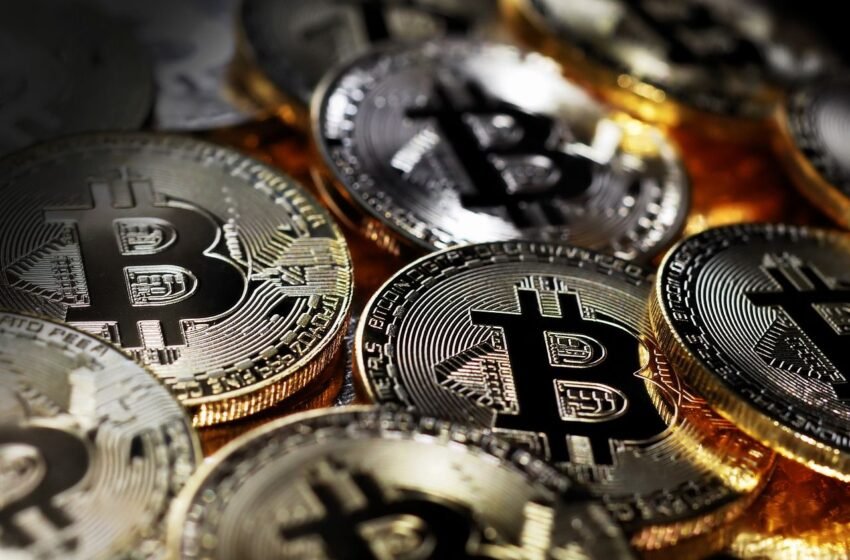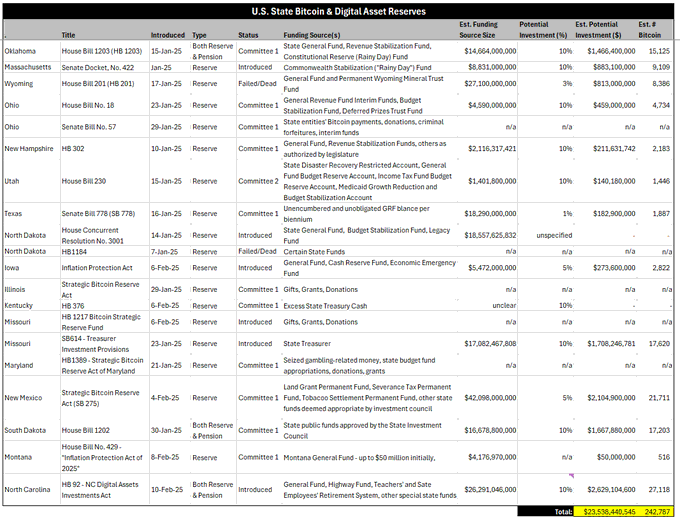30% Bitcoin Drop Sparks Terror as Sentiment Indexes Hit ‘Extreme
$23B Bitcoin boom? VanEck says state reserve bills could spark massive inflows
(Originally posted on : Invezz )
Several US states, including Texas, Pennsylvania, and Ohio, are pushing proposals to invest public funds in cryptocurrencies or establish state-level bitcoin reserves.
Asset manager VanEck analysed 20 such bills and estimated that, if implemented, they could lead to $23 billion in bitcoin purchases, equivalent to approximately 242,700 BTC.
We analyzed 20 state-level Bitcoin reserve bills.
If enacted, they could drive $23 billion in buying, or 247k BTC.
This sum is independent of any pension fund allocations, likely to rise if legislators move forward.
This estimate excludes potential contributions from pension funds and is expected to rise as legislative efforts progress.
Florida recently proposed a bill to allow state investments in bitcoin and other cryptocurrencies, while North Carolina introduced legislation enabling the State Treasurer to invest in “qualifying digital assets.”
Meanwhile, Arizona’s Senate Finance Committee approved a similar bill, which now moves to the Senate Rules Committee for further consideration.
States like Colorado, Utah, and Louisiana already accept cryptocurrencies for state payments, and Detroit announced plans last year to become the largest US city to accept crypto.
Trump’s pro-crypto government
At the federal level, President Donald Trump has directed efforts to establish a regulatory framework for digital assets, including stablecoins, and to evaluate a potential national digital assets reserve.
White House Crypto Czar David Sacks recently praised Bitcoin as an “excellent store of value.”
The BITCOIN Act of 2024, introduced by Senator Cynthia Lummis, proposes the US Treasury acquire 1 million BTC over five years to create a national bitcoin reserve.
VanEck modeled the impact of such a reserve, suggesting it could offset $42 trillion of US national debt by 2049, provided Bitcoin grows 25% annually to reach $42.3 million per BTC.
However, this optimistic scenario requires a 43,000% price increase over 24 years and assumes US debt compounds at 5% annually from a base of $37 trillion in 2025.
Between Q4 2022 and Q4 2024, governments worldwide added 377,000 BTC to their reserves, mainly through criminal seizures, according to VanEck.
State-level bitcoin reserves and a potential federal stockpile could significantly impact the adoption of digital assets and influence global cryptocurrency markets.
As state and federal initiatives to incorporate Bitcoin into fiscal strategies gather momentum, these developments highlight the growing recognition of digital assets in economic planning and their potential role in addressing national debt and driving financial innovation.
The states of Bitcoin
Earlier this week, Maryland and Kentucky joined a growing number of US states considering Bitcoin and digital assets as part of their financial strategies to bolster reserves.
In Maryland, Democratic State Delegate Caylin Young introduced the “Strategic Bitcoin Reserve Act of Maryland” this week.
The proposed legislation would allow the state to establish a Bitcoin reserve, explicitly naming the cryptocurrency in the bill.
It also grants the Maryland State Treasurer the authority to invest in Bitcoin using funds derived from the enforcement of gambling violations.
Meanwhile, Kentucky’s House Bill 376, introduced by Republican State Representative TJ Roberts, also aims to authorize state investments in digital assets and precious metals.
Although the bill does not mention Bitcoin by name, it limits eligible digital assets to those with a market capitalization of at least $750 billion, effectively designating Bitcoin as the primary option.
Maryland and Kentucky join 16 other states that have proposed similar legislation, while North Dakota remains the only state to have outright rejected such a measure, according to the Bitcoin Reserve Monitor.
The post $23B Bitcoin boom? VanEck says state reserve bills could spark massive inflows appeared first on Invezz








 Bitcoin
Bitcoin  Ethereum
Ethereum  Tether
Tether  XRP
XRP  USDC
USDC  TRON
TRON  Lido Staked Ether
Lido Staked Ether  Dogecoin
Dogecoin  Cardano
Cardano  Figure Heloc
Figure Heloc  WhiteBIT Coin
WhiteBIT Coin  Wrapped stETH
Wrapped stETH  Bitcoin Cash
Bitcoin Cash  Wrapped Bitcoin
Wrapped Bitcoin  USDS
USDS  Binance Bridged USDT (BNB Smart Chain)
Binance Bridged USDT (BNB Smart Chain)  LEO Token
LEO Token  Zcash
Zcash  Hyperliquid
Hyperliquid  Chainlink
Chainlink  Ethena USDe
Ethena USDe  Stellar
Stellar  WETH
WETH  Wrapped eETH
Wrapped eETH  Monero
Monero  Litecoin
Litecoin  Coinbase Wrapped BTC
Coinbase Wrapped BTC  Avalanche
Avalanche  Hedera
Hedera  Sui
Sui  Shiba Inu
Shiba Inu  Dai
Dai  Ethena Staked USDe
Ethena Staked USDe  World Liberty Financial
World Liberty Financial  USDT0
USDT0  sUSDS
sUSDS  Uniswap
Uniswap  Toncoin
Toncoin  Polkadot
Polkadot  Cronos
Cronos  PayPal USD
PayPal USD  MemeCore
MemeCore  Mantle
Mantle  USD1
USD1  Canton
Canton  Bittensor
Bittensor  Currency One USD
Currency One USD  Bitget Token
Bitget Token  Aave
Aave  Aster
Aster  BlackRock USD Institutional Digital Liquidity Fund
BlackRock USD Institutional Digital Liquidity Fund  NEAR Protocol
NEAR Protocol  Internet Computer
Internet Computer  Falcon USD
Falcon USD  OKB
OKB  Tether Gold
Tether Gold  Ethereum Classic
Ethereum Classic  Pi Network
Pi Network  Jupiter Perpetuals Liquidity Provider Token
Jupiter Perpetuals Liquidity Provider Token  Jito Staked SOL
Jito Staked SOL  Ethena
Ethena  Pepe
Pepe  Aptos
Aptos  Binance-Peg WETH
Binance-Peg WETH  Wrapped SOL
Wrapped SOL  HTX DAO
HTX DAO  Pump.fun
Pump.fun  KuCoin
KuCoin  Ondo
Ondo  Worldcoin
Worldcoin  POL (ex-MATIC)
POL (ex-MATIC)  PAX Gold
PAX Gold  USDtb
USDtb  BFUSD
BFUSD  syrupUSDC
syrupUSDC  Binance Bridged USDC (BNB Smart Chain)
Binance Bridged USDC (BNB Smart Chain)  Official Trump
Official Trump  Cosmos Hub
Cosmos Hub  Algorand
Algorand  Rocket Pool ETH
Rocket Pool ETH  Circle USYC
Circle USYC  Global Dollar
Global Dollar  Ripple USD
Ripple USD  Filecoin
Filecoin  Gate
Gate  Wrapped BNB
Wrapped BNB  Binance Staked SOL
Binance Staked SOL  Arbitrum
Arbitrum  Quant
Quant  VeChain
VeChain  Function FBTC
Function FBTC  Kinetiq Staked HYPE
Kinetiq Staked HYPE  Lombard Staked BTC
Lombard Staked BTC  Superstate Short Duration U.S. Government Securities Fund (USTB)
Superstate Short Duration U.S. Government Securities Fund (USTB)